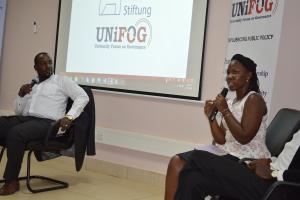Event reports
To lay a firm foundation for the debate, a short presentation by Bruce Kabassa, an associate director at UNIFOG offered insights into the origin of UNIFOG’s interests on youth organizational cooperation. He stated that the need to strengthen cooperation among youth organizations was highlighted in earlier debates held by UNIFOG at various universities in Uganda where students identified lack of strong organizations and competition as one of the challenges to youth participation in electoral processes.
Similarly, Donnas Ojok, a programme officer at KAS also gave a short presentation which majorly explored some of the contextual and theoretical underpinnings of cooperation as a quintessential tool for political development and youth development. He emphasized the need to cooperate rather compete by highlighting the costs of competition which involves resource wastage, erosion of trust and breeding corruption – all of which are detrimental to youth political organization.
The panel session which was composed of four young leaders and university students took the topic of youth co-operation and expounded on it breadth. Chebet Esther, a political activist and student at Cavendish University highlighted that the role of Uganda’s education system which promotes competition. She pointed out the need for the government to craft policies which induces cooperation right from childhood, an issue she argues will enable young people to grow up knowing that when you work together in harmony you win and reap big rather than competing with one another. Jeremiah Keyamwangi, a young lawyer insisted that the concept of cooperation will still continue to be elusive if youth are not aware of the ensuing incentives associated with it. As such he suggested the need for a robust campaign among youth organizations to sensitize them about the relevance of cooperation. He reiterated on the need to first embark on mindset transformation and tolerance amongst young people if they are to become agents of organizational change in their communities.
During the plenary session, participants observed the need for more sensitization to young people in order to understand that politics and engagement is more about cooperation. However, there was a continued insistence that competition can still be good provided it is a healthy one. Participants also alluded to the weaknesses within the existing national youth organizational platform noting their they are breeding grounds for competition because they are driven using the "survival for the fittest" idealogy - meaning that only youth with some sort of connections to the NRM government are always the major beneficiaries.
Ivan Rugambwa, a panelist and Mass Communication student at Makerere University also noted the major challenge with these national youth organizations are their increasing embeddedness with the government. This in essence destroys the independence of such organizations making them mere appendages of the government system. This is a danger because it is always believed by many youth that the government is not doing enough to overhaul their current predicaments.
Tushabomwe Brian, another student panelist made a clarion call to national organizations working for the youth like Uganda National Students Associations (UNSA), National Youth Council (NYC) which have failed to live up to their expectations to wake up or else young people’s interests in these organizations will continue to keep on a downward spiral.
In conclusion, the debate urged the youth to engage actively in youth organizations and to embrace common aspirations to build cooperation and effectiveness.






